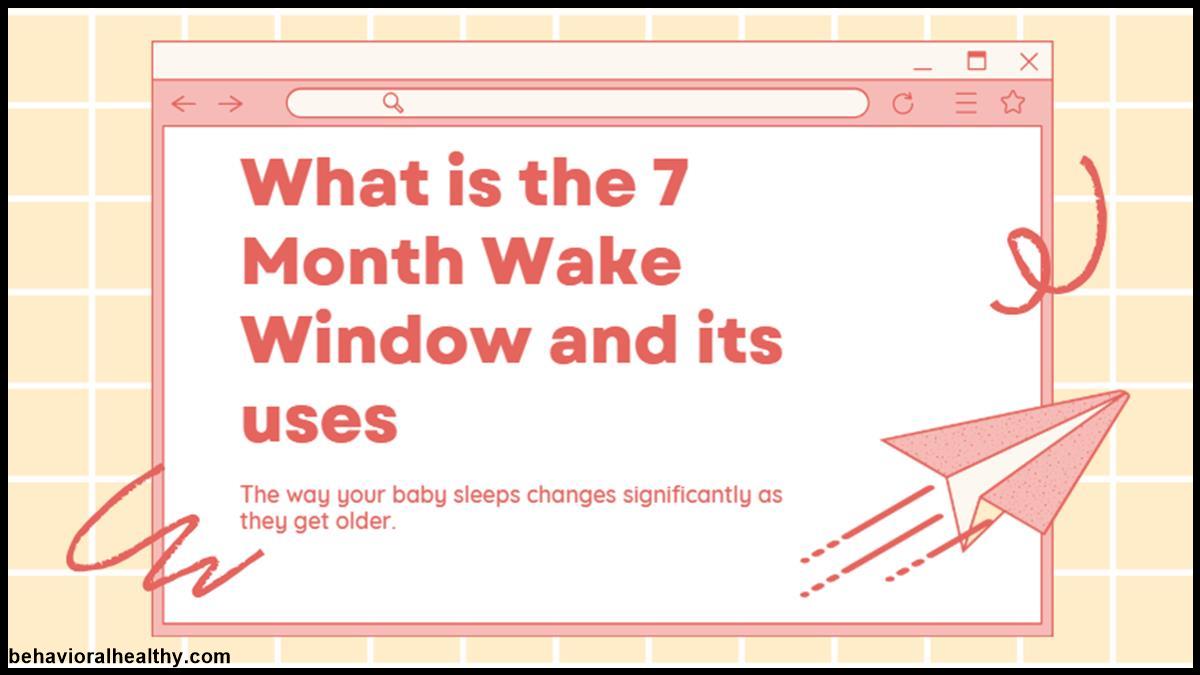7-month wake windows greatly influence the sleep cycle and general development of your baby.
Table of Contents
7-Month Wake Windows – Why They Are Important
The way your baby sleeps changes significantly as they get older. As your baby grows, you should clearly know about 7-month wake windows. By the time they are seven months old, they are probably over the newborn stage and are starting to establish more regular sleep and waking patterns. Comprehending and utilizing suitable wake windows is crucial in maximizing your infant's sleep at this age.
The times between naps a newborn can stay awake without getting too exhausted are known as wake windows. Wake windows are essential for a 7-month-old's good sleep schedule, helping their physical and cognitive development and ensuring they are happier and more rested. Let's discuss more about 7-month wake windows in detail:
What Are 7 Month Wake Windows?
7-month wake windows are how long your baby can stay awake before they need to go back to sleep. These times differ depending on the baby's age, as they age, they require less sleep. Wake windows for babies typically last only 45 to 60 minutes. Wake windows, however, usually span two to three hours by seven months.
Understanding wake windows involves paying attention to your baby's cues and modifying their sleep schedule to fit their natural biological rhythms. If managed properly, wake windows can help your baby fall asleep more easily and feel refreshed and ready to explore their environment.
Why Are 7-Month Wake Windows Important?
- Enhances the Quality of Your Sleep
If your wake windows are timed correctly your infant will be neither too weary nor sleepy for naps or bedtime. An infant may become overtired from staying up too late might cause them to produce more cortisol a stress hormone that can make it more difficult for them to fall asleep. If a baby isn't up for long enough they may not feel drowsy and may not want to nap might throw off their sleep schedule.
- Promotes the Development of the Brain
The 7-month-old wake window has a major impact on the baby's development. While awake, babies take in their environment and interact with others. Wake windows that are appropriately matched to their demands allow them to get the restorative sleep required for brain development and memory consolidation while still making the most of their learning and exploration.
- Aids in Controlling Sleep Cycles
Natural biological systems that control the sleep-wake cycle, known as circadian rhythms, are not fully developed in newborns. However, the wake window for 7-month-olds is becoming more consistent, and consistently following facilitates newborn transition into a healthy sleep-wake cycle.
- Avoids Being Overtired
Improperly controlling wake windows can cause overtiredness, frequently leading to irritability, quick naps, and midnight awakenings. On the other hand, naps might not be restorative if waking windows are too brief, which could cause sleep disturbances later in the day or at night. Finding the ideal balance can help keep your infant happy and rested.
Signs Your Baby Is Ready for a Nap
Sleep is essential for the development of the baby. Your kid will likely become used to a more regular nap routine by the time they are seven months old. Since each baby is different you can ensure they get the rest they require by knowing when they are ready for a nap.
- Yawning
Yawning is a common indication of sleep. Your infant begins to feel exhausted and needs rest if you observe them yawning frequently.
- Rubbing the Ears or Eyes
When tired, many babies pull at their ears or rub their eyes. This behavior may indicate from their bodies that it's time to relax and get ready for sleep.
- Irritability and Fussiness
When a 7-month-old's naps are past due, they may become fussy or agitated. Your infant might just be sleepy if it starts crying more frequently, becomes difficult to calm, or refuses to interact with toys or people.
- Reduced Level of Activity
Your baby may be ready for a nap if their energy levels decline and they show less interest in playing or exploring their environment. An abrupt reduction in activity sometimes precedes sleep.
- Diminished Interest in Food or Playthings
A baby may stop wanting to feed or play when exhausted. It might be time for a nap if your child stops playing with their favorite toy or turns away from meals.
- Clinginess
When a baby is too fatigued, it may cling to a carer to feel better. If it suddenly becomes more attached and refuses to be put down, your baby may be trying to tell you they need to sleep.
Bottom line:
7-month wake windows greatly influence the sleep cycle and general development of your baby. Although broad recommendations offer a place to start, every infant is different and needs tailored modifications depending on their requirements and cues. You can assist your infant in getting the sleep they require to flourish by keeping an eye on their behavior, sticking to a regular schedule, and remaining adaptable.

